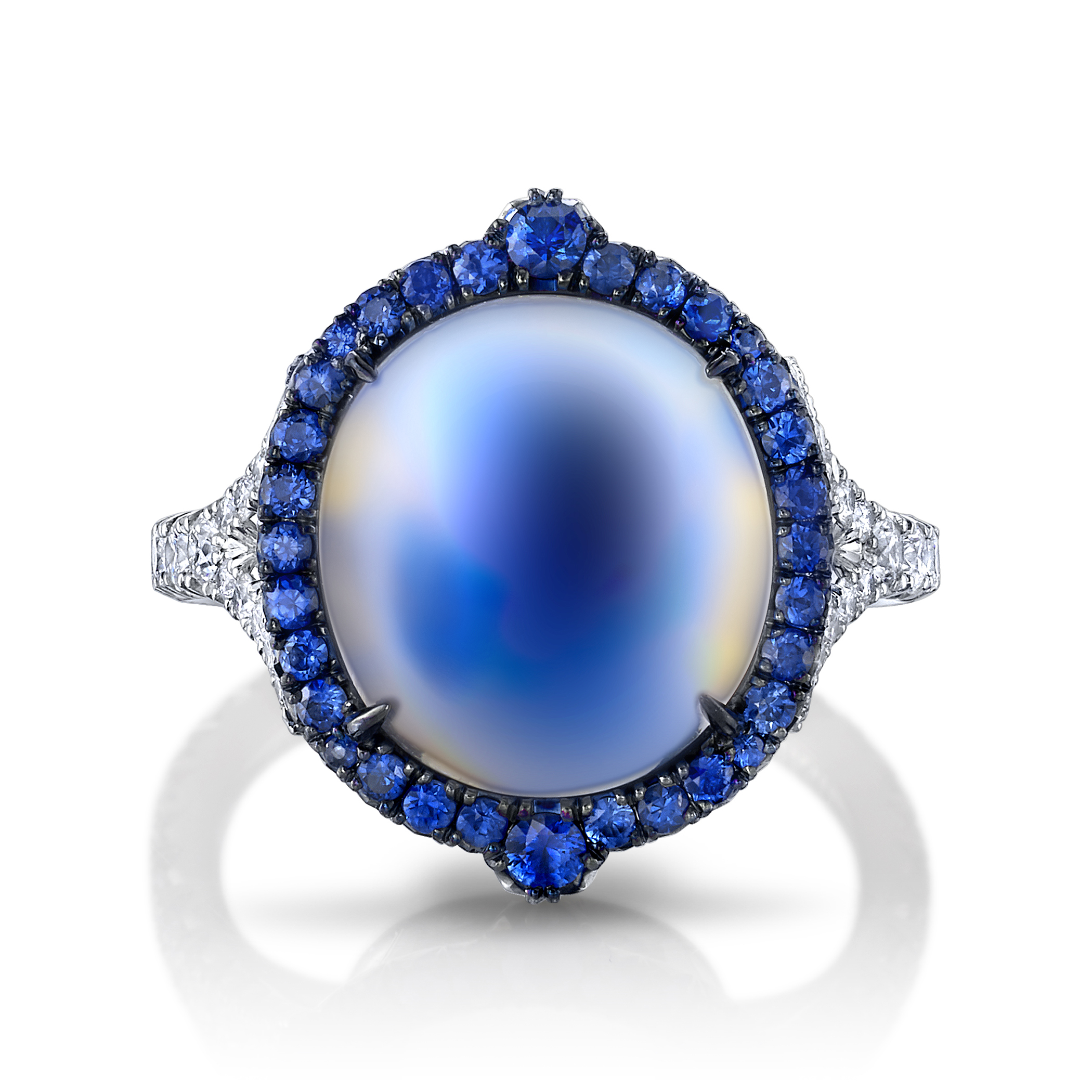


Moonstone, Sapphire & Diamond Ring
Platinum ring featuring a 7.38 carat oval moonstone accented by 0.45 carat total weight of round sapphires and 0.54 carat total weight of round diamonds.
R2406-RC1798-MSOV
Design Details
Moonstone, Sapphire & Diamond Ring
Platinum with Black Rhodium, Size 6.5
1 Moonstone Oval 7.38 ct. (12.8x11.5x6.8mm) - Natural
34 Sapphire Rd 0.45 ctw. - Heated
36 Diamond Rd 0.54 ctw. (F+/VS+)
Unique Design Traits
In this bold design, the blue sheen of the striking large moonstone center is mirrored in the buff tops of the outer oval sapphire halo.
Highest quality moonstone will be transparent without inclusions and clearly visible blue sheen. Most Moonstones tend to be included and/or semi-transparent.
Moonstone is plated in metal underneath helping to display the billowing adularescence (blue sheen/glow) of the moonstone.
Gemstone Details
Moonstone
A member of the feldspar group, orthoclase, moonstone is known for its distinct sheen under certain lighting conditions called adularescence. Its name is owed to this phenomenon, the blue sheen is said to resemble the glow of the moon. Adularescence is a result of a natural growth pattern of alternating layers of feldspar minerals, orthoclase and albite. This layering causes an interference of light as it enters the stone, reflecting back as the sheen beloved in moonstones, making them appear to glow from within.
Legends say the stone provides good luck, Hindu legend believes it was formed by moonbeams, and in Arab countries, women historically sewed moonstones into their garments to promote fertility. Properties often associated with the moon has been applied to this gemstone, such as romance, femininity, intuition, dreams and love. Long been a favored gemstone in jewelry, designers of the romantic Art Nouveau era, such as René Lalique and Louis Comfort Tiffany, heavily featured moonstone.
Like most gemstones, the most prized moonstones contain no visible inclusions; they will also have a colorless, semitransparent to nearly transparent body color with strong vivid adularescence.
Moonstone is one of the birthstones for June.
Blue Sapphire
Velvety blue. Liquid blue. Evening-sky blue. Cornflower blue. Sapphire, beloved for centuries as the ultimate blue gemstone. The ancient Persian rulers believed that the earth rested on a giant sapphire and its reflection colored the heavens blue.
But like the endless colors that appear in the sky, sapphire is also found in many other shades besides blue, from the gold of a sunrise, to the fiery reddish-orange of sunset, to the delicate violet of twilight. Sapphire may even resemble the pale white gloaming of an overcast day. These diverse colors are referred to as "fancy" color sapphires.
A gift of a sapphire symbolizes a pledge of trust and loyalty. It is from this tradition that sapphire has long been a popular choice for engagement rings. One of nature's most durable gemstones, sapphire shares this quality with its sister, the ruby.
Sapphire is found in many parts of the world, but the most prized sapphires are from Myanmar (Burma), Kashmir and Sri Lanka. The purer the blue of the sapphire, the greater the price the gemstone can command, however, many people find that the darker hues of sapphire can be just as appealing.
Over the centuries, methods have been developed to enhance the purest hues of sapphire. This is now commonly achieved by controlled heating, a technique that not only improves color but also improves clarity. But heating will only improve the color if the gemstone already contains the chemistry required. Heating sapphires is a permanent enhancement, as lasting as the gemstones themselves.
With a hardness of 9 on the Moh's scale, sapphire of any color is one of the hardest gemstones available save the diamond. Due to their crystal growth, larger sapphires are most often found in fancy brilliant cuts, like oval or cushion, large rounds and emerald cuts are markedly rarer to encounter.
Sapphire is the birthstone for September and the gem of the 5th and 45th anniversaries.

